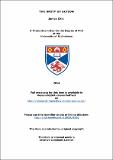Files in this item
The unity of action
Item metadata
| dc.contributor.advisor | Broadie, Sarah | |
| dc.contributor.advisor | Haldane, John | |
| dc.contributor.author | Chik, Janice Tzuling | |
| dc.coverage.spatial | 240 | en_US |
| dc.date.accessioned | 2015-04-23T13:32:51Z | |
| dc.date.available | 2015-04-23T13:32:51Z | |
| dc.date.issued | 2015-06-25 | |
| dc.identifier | uk.bl.ethos.644840 | |
| dc.identifier.uri | https://hdl.handle.net/10023/6550 | |
| dc.description.abstract | This thesis develops a disjunctivist approach to action as an alternative to the standard causal theory, or 'causalism'. The standard theory promotes a concept of action as constituted by a bodily event joined to certain mental conditions by a bond of causation. A disjunctivist approach, in contrast, claims that action must be distinguished by more than merely its etiology: action and mere movement are fundamentally different kinds. Recent objections to the causal theory of action are first surveyed, and the common causalist assumption claiming Aristotle as the progenitor of the causal theory is examined and dismissed. More refined interpretations of Aristotle's thought on action yield two different concepts: action as change, and action as a unified psychophysical process. The latter in particular is argued to hold promise as a basis for developing the disjunctivist approach to action. The remainder of the thesis therefore considers a contemporary account of psychophysicality, known as 'embodiment theory' (Hanna and Maiese 2009), with the conclusion that the intelligibility of the account depends on appeal to a recent variant of top-down causation (Steward 2012). The thesis also concludes that consideration of the concept of an animal agent makes it entirely unsurprising that the mental and physical are always found together in voluntary movement, and that the embodiment theory’s central notion of ‘property fusion’ potentially complements a naturalistic variant of top-down causation in explanations of agency. | en_US |
| dc.language.iso | en | en_US |
| dc.publisher | University of St Andrews | |
| dc.rights | Creative Commons Attribution-NonCommercial-NoDerivatives 4.0 International | |
| dc.rights.uri | http://creativecommons.org/licenses/by-nc-nd/4.0/ | |
| dc.subject | Action | en_US |
| dc.subject | Disjunctivism | en_US |
| dc.subject | Movement | en_US |
| dc.subject | Causalism | en_US |
| dc.subject | Aristotle | en_US |
| dc.subject | Psychophysicality | en_US |
| dc.subject | Hylomorphism | en_US |
| dc.subject | Causation | en_US |
| dc.subject | Agent | en_US |
| dc.subject | Cartesian | en_US |
| dc.subject | Perception | en_US |
| dc.subject | Davidson | en_US |
| dc.subject.lcc | B105.A35C5 | |
| dc.subject.lcsh | Act (Philosophy) | en_US |
| dc.subject.lcsh | Perception (Philosophy) | en_US |
| dc.subject.lcsh | Movement (Philosophy) | en_US |
| dc.subject.lcsh | Aristotle | en_US |
| dc.subject.lcsh | Hylomorphism | en_US |
| dc.subject.lcsh | Causation | en_US |
| dc.subject.lcsh | Descartes, René, 1596-1650 | en_US |
| dc.title | The unity of action | en_US |
| dc.type | Thesis | en_US |
| dc.type.qualificationlevel | Doctoral | en_US |
| dc.type.qualificationname | PhD Doctor of Philosophy | en_US |
| dc.publisher.institution | The University of St Andrews | en_US |
This item appears in the following Collection(s)
Except where otherwise noted within the work, this item's licence for re-use is described as Creative Commons Attribution-NonCommercial-NoDerivatives 4.0 International
Items in the St Andrews Research Repository are protected by copyright, with all rights reserved, unless otherwise indicated.


